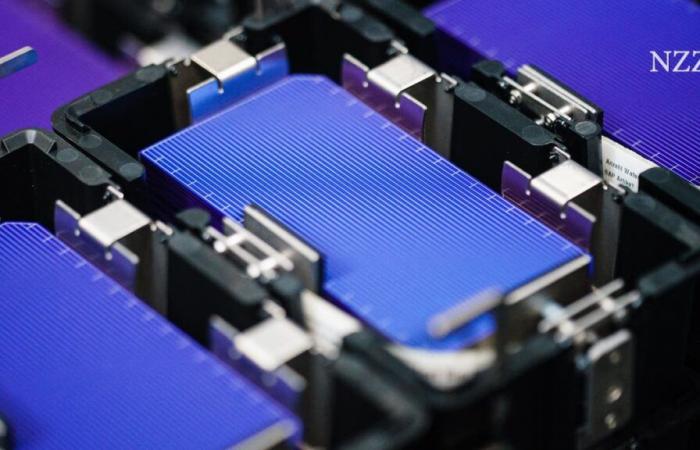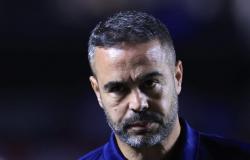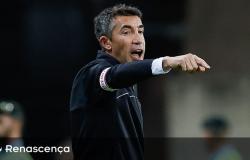The solar module manufacturer wanted to avert collapse by concentrating on purchase contracts that had already been concluded. But the most important buyer doesn’t want to know anything about it anymore.
Solar modules from Meyer Burger: Are there new buyers?
Clemens Bilan / EPA
The badly hit solar module manufacturer Meyer Burger decided to focus on security: three months ago it announced that it would only produce as many modules as could be sold in the USA through purchase agreements that had already been concluded. On this foundation, the company built its attempt to shrink and stabilize financially.
Stocks plummet almost to zero
Now even this smallest possible goal has become a long way off and the survival of Meyer Burger is acutely threatened. The major American customer Desri, which was supposed to purchase around 70 percent of the supposedly guaranteed quantity of solar modules, is no longer interested in this. Desri has declared that it will terminate the framework agreement with immediate effect, Meyer Burger announced on Friday. The company had previously suspended its shares from trading on the Swiss SIX stock exchange.
After stock trading resumed, stocks collapsed and lost around 60 percent of their value over the course of the day. Meyer Burger securities closed at 44 centimes. A year ago they were still trading at just under 80 francs, assuming a share consolidation that took place in the summer was taken into account. In the winter of 2023 it was almost 190 francs.
It was a decline in installments: After the predominance of cheap Chinese solar cells in Europe became ever greater and subsidies for the solar industry were not forthcoming in Germany, Meyer Burger decided in the spring to move production from East Germany to the USA. However, in the middle of this process, the Thun-based company ran out of money.
Only three customers – and the biggest one wants to leave
This was followed by an attempt to save what could be saved. Solar cells manufactured by Meyer Burger in Germany were to be delivered to the USA, where another of the company’s plants in the state of Arizona would assemble them into solar modules. Previously large expansion plans were canceled and jobs were cut. Only existing contracts should be fulfilled. At the beginning of November, Meyer Burger stated that production for the next three to four years would be largely absorbed by the contracts.
The Arizona factory under construction would produce modules with a capacity of 1.4 gigawatts per year. In 2022, Meyer Burger agreed with Desri to purchase modules with a volume of 3.75 gigawatts between 2024 and 2029. The investment company of the largest IKEA retail group, Ingka, and Baywa, a company from Bavaria, were named as further permanent customers. However, according to an estimate by UBS, their purchase volumes only amounted to 0.4 gigawatts and 1.25 gigawatts in the period from 2025 to 2029.
The hoped-for sales to Desri were the largest and also the first that Meyer Berger wanted to fulfill with production in the USA. The solar module manufacturer did not say why the Americans canceled this purchase. Desri stands for DE Shaw Renewable Investments, a subsidiary of the investment firm DE Shaw specializing in the operation of renewable energy projects and managing hedge funds and private equity vehicles.
Debt restructuring is becoming less likely
According to its own information, Desri operates solar and wind farms in the USA with a total capacity of 10 gigawatts. In spring 2024, when Meyer Burger pushed ahead with the complete move to the USA, the Americans also wanted to participate in a capital increase. However, in the end, Meyer Burger was unable to raise all the financing it needed for its expansion plans in the USA. CEO Gunther Erfurt left the company in mid-September.
Desri’s termination is also a low blow because Meyer Burger is currently trying to restructure its debts with bondholders. The failed expansion resulted in high costs, and the restructuring is necessary so that the company can advance production even on a small scale. In September, Meyer Burger only had cash of 83 million francs; There was a financing gap of an estimated 100 million francs.
But why should the creditors make concessions now when the largest customer no longer believes in Meyer Burger? The company believes that Desri’s termination – the validity of which is still under review – will likely impact the attempted restructuring. If this fails, Meyer Burger says it can no longer guarantee its continued existence.
Not a viable business model
After Chinese competition in the mass market for solar modules became too great, Meyer Burger had hoped to be able to survive with the help of subsidies: first in vain in Germany, then in the USA, where the market is protected by tariffs and the government of President Joe Biden has extensive measures had listed subsidies for solar projects.
But even that wasn’t enough to give the company a viable business model – something that became apparent even before Donald Trump, who doesn’t think much of renewable energy, won the presidential election. The fact that a constellation will emerge that will free Meyer Burger from this misery seems as unlikely as a solar eclipse.






